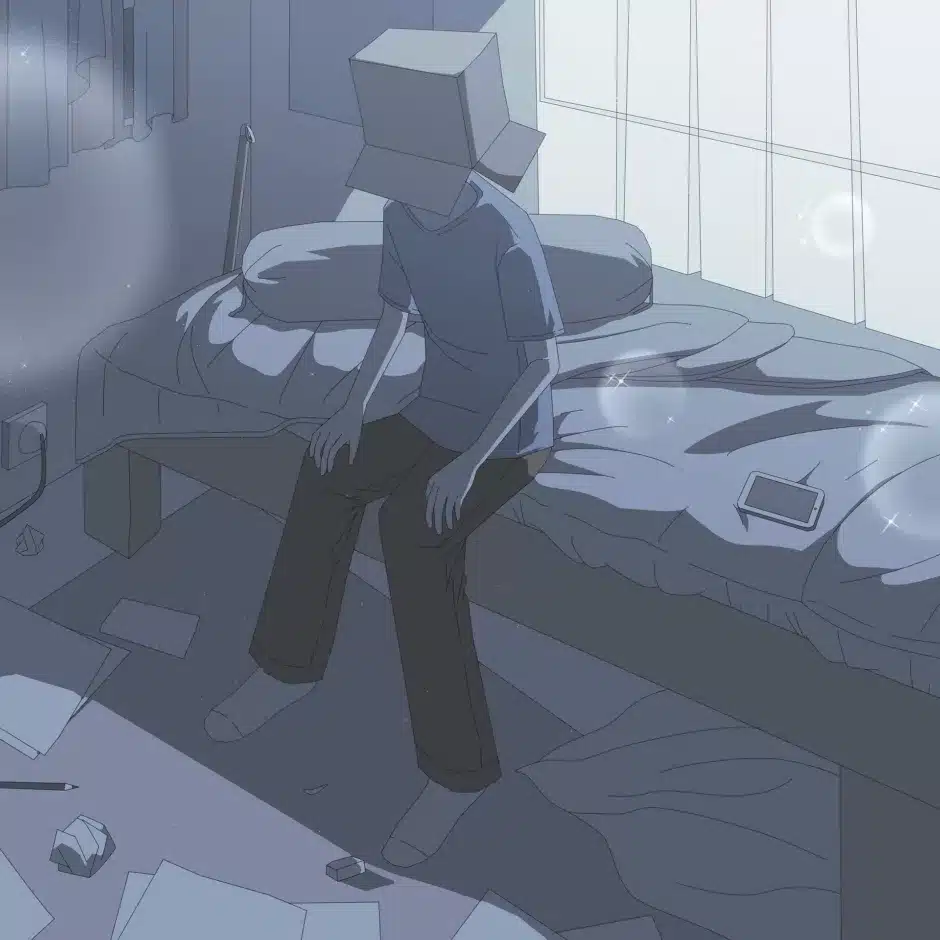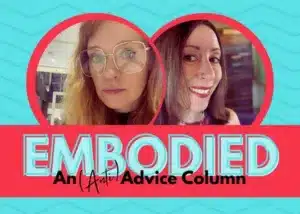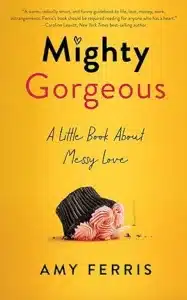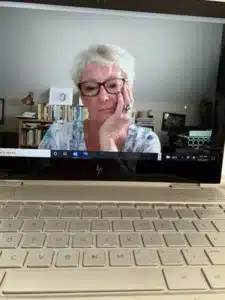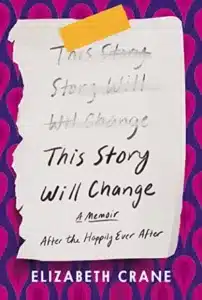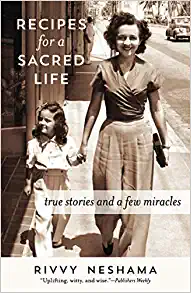A mid-afternoon text message from my son flashes on my screen.
“Are you free to talk for a second?”
He’s a sophomore at a small liberal arts college half an hour away from the Connecticut suburb where he was raised, and where his dad and I live separately but on the same street, as we have done since our divorce five years ago.
At the sight of the brief text my heart skips a beat. I have come to learn that usually, when my son reaches out it’s because he needs me, emotionally. He’s a super sensitive soul and an empath, so I worry easily he’s sad in some way, although generally I take it in stride since it seems the waxing and waning of existential blues experienced by a young adult is par for the course.
“Hey mamma, what do you do whenever you’re feeling depressed?”
There’s a slow rush to my head, hopeful by his seemingly upbeat “hey” but jarred by the word “depressed.” I know depressed. I remember suffering as a young adult walking around in a kind of grey daze from poor nights’ sleep, alternating between rapid heartbeats accompanied by cold sweats and waves of grating anxieties, obsessing about, well, most tings. But it usually passed after a week or two, and these occasional bouts diminished in my mid-twenties, after I got dogs (first), then children (later).
I swipe the screen on my phone and my fingers start their familiar tap dance across the miniscule keyboard.
“That depends how depressed,” I begin. “Let me call you this evening and we’ll talk about it, ok?”
Then I continue in rapid succession,
“Hang in there.”
“It will pass.”
“In the meantime, be good to yourself and trust that it will get better.”
But I know deep down that only if he’s lucky will it get better by itself, and that if not, it may be a much longer journey. I had watched my closest friend’s husband spiral down the path of mental illness, and it taught me not think lightly of calls for help.
“<3333,” my son answers.
I switch to the emoji keyboard and send him back three read hearts.
Before the back and forth ends, his string of short texts forms the narrative of a young man asking for help:
“Between you and me I’m in a bit of a rut right now.”
“Can you talk?”
“Can I call you around 4pm before I start my work shift?”
We touch base later that day and the conversation is just vaguely about his state of mind and more about daily stuff. We agree to meet for lunch the next day, a proposition my son rarely turns down since it means a free, non-cafeteria meal at one of the many delicious restaurants in his college town, with a side of helpful mamma-conversation.
Luckily, he is open and likes to share, if I can just pin him down. We both enjoy these moments of mother-son tête-à-têtes; one of the perks of having your child go to college close to home.
Zooming down the highway a sunny fall afternoon the next day, I call to let him know that I’m there in five minutes.
“Should I pick you up from work?” I offer, knowing he’s just ending his lunch shift at a campus restaurant.
“Nah, that’s ok,” he answers, and I hear him breathing heavy and figure he is walking.
“I’m already almost back at my place.”
I wonder if he is hurrying home to pick up any telling paraphernalia in his room (cigarette packs, bong, condoms…).
“I’m just gonna take a quick shower,” he adds.
“You can wait outside in the car, and I’ll be out in a few minutes.”
I resign myself to a longish wait; I know his sense of time isn’t mine. Parked in front of his house, I wait for a while, but then get antsy and decide to go in. The door is unlocked, and I first take a seat in the kitchen he and his roommates share, noticing the door leading to his room is slightly ajar. He’s in the shower upstairs, most likely taking his time to get rid of the cigarette smell he knows I don’t like.
Against my better judgment, I get up and slowly push open the door to his room. From the scene that reveals itself it’s clear that something’s off. This isn’t a regular college kid’s messy room. There’s garbage scattered on the floor, cigarette butts in paper cups, dirty cereal bowls piled under his low coffee table, many with soured, crusty and milky cereal remnants; partially empty cans, cups, and bottles lined up along the edge of the bottom of the couch, and dirty laundry dropped on the floor and furniture, pell-mell. The hangers that used to hold his clothes are tossed to the side haphazardly, his closet ravaged, and the dust on his coffee table has accumulated over so long it now looks more like a grey furry carpet littered with coins, lighters, strands of tobacco and empty soda cans. I take a deep breath and notice myself mutter “Oh sweetie…”
When I hear him come down the stairs, I quickly slip back to the kitchen and pretend that I haven’t seen a thing, because I don’t know how to start the conversation right then and there. I need to think about how to tread lightly, not to put him on the defensive.
“Hi mamma! How are ya?”
A bath towel draped around his waist, he tries to sound cheerful and gives me a peck on the cheek before disappearing into his room. His hair is overgrown, and he has let his scraggly facial hair sprout in all directions.
“Just gimme a sec!” he calls out from behind the door.
I hear him scramble, probably to find something, anything, that is clean enough to wear.
On the way to the restaurant, we catch up on this and that, but no mention of his state of mind or what I had witnessed in his room.
Once seated across from each other in a cozy booth with green leather seats, we order our drinks and food, and the midday sun shines through the window warming our spot like a caring and encouraging embrace. We fall silent for a minute, and when I look up, I notice his eyes tearing up.
“Do you want to talk about how you’re feeling, honey?”
He doesn’t answer and I can tell he is fighting back tears. He lets out a big breath, more like a resigned, quivery sigh, and leans forward reaching his arm across the table, his hand looking for mine. My boy is not in a good place.
I grab the big, warm, strong hand of my former heavyweight-wrestling-champion-and- football-team-son, the English-and-sociology-major-uber-empath-sensitive-musician-son, the son who prefers to get lost in books and music, much more than huddling in testosteroney powwows with fellow athletes.
His size made him a coveted athlete and joining in sports made the transitions easier from a small Jewish elementary and middle school to public high school and then college. It also gave him an immediate sense of belonging – which reduced his social unease.
Now, he had quit football and wrestling in what I saw as a brave act of being true to himself, but he had not yet started new extracurricular activities, like the music or writing he wanted to develop, things that would help build a new network of peers, of poetry, of inspiration.
To make things worse, his fraternity, where he had been the house manager and where he had lived and worked over the summer, was unexpectedly closed by campus administration after a troubled year for campus fraternities. This meant that just as the fall semester was staring, he and about twenty-five other students were scrambling for places to live, and he was placed in a senior house with four Asian foreign students who were all business majors. Great kids, but not necessarily a good fit, socially.
Add to this the fact his first significant romantic relationship had ended in a dramatic way the prior semester. While he and his girlfriend were in NYC for a weekend, his girlfriend had a panic attack and was evacuated by her dad, leaving my son alone and confused in the AirBnB apartment they had rented.
Difficult experiences had accumulated during the year, and the emotional fallout was significant.
In the restaurant, he finally begins to speak through his tears. But when he tells me that everything feels hopeless, I realize it isn’t just a mild case of the blues. Holding on tight but tenderly to his hand with both of mine, I look at him and tell him how I too, had struggled with those kids of emotions when I was his age. I recall the feeling of not being myself, watching helplessly from the outside while the shell of me would suffer quietly, a feeling he could identify with. I tell him I am happy he is asking for help, how much I love that he is open and shares with me, and that we’ll find a way through this together.
When I add that I kind of knew the lay of the land because I had peeked into his room, he quietly groans.
“Let’s face it honey,” I add, trying my best to sound positive, “I’ve seen it all!” I smile.
“Now let’s take some small steps to pick up the pieces and make you whole and happy again.”
He tries to smile and thanks me for being me and for being there with him; words that make a mamma’s heart swell with tenderness. I try not to show how helpless I feel. How in that moment, I wish I could lift his sadness and hopelessness from him and carry that heavy burden for him, stuff it into my body, at any cost.
“I know this may seem superficial,” I begin, “but taking care of a few obvious external things can be one small step toward dealing with the situation. Let’s stop in at the barber next door and just clean this mess up,” I say, motioning to his head and face. We both chuckle at the obvious double meaning of “this mess.”
He groans again and mutters “fine,” knowing that he is in my hands now. Soon he is draped in a black smock at the young, hip, Latino barber’s shop next door, and the two of them are discussing music while the buzzer runs its course. I take the opportunity to step outside and search the student health website of the college for resources. My fingers are jittery from the heightened emotions, but I feel unstoppable now; a hyper-alert lioness pushed into assertive protective mode for her wounded cub.
Before he emerges clean-shaven and already looking less weighed down, I’ve booked him an appointment with the school nurse who can refer him to the school psychologist. I have also written an email to the dean in charge of mentoring his class, sharing with her that right now is a time my son could use an on-campus supporter, asking her to reach out and follow up with him.
In the car on the way back to campus I say I want to come back to his room to help him clear the disaster zone. He doesn’t try to stop me since at this point, he has realized I will not relent, and he has no energy to resist.
In his room, I discover that he has been stuffing dirty laundry into huge garbage bags and shoved them under his bed for what must have been months. We pull so much stuff out from there that even he is amazed at what we find, and laughs. It warms my heart to see him smile. In the cleanup process, we hug and chitchat while I try my best to sound upbeat and positive.
But on the inside, I feel scared for my son, and humbled by how easy it has been to lose sight of how he really was doing, when our only way of staying in touch had been reduced to texting or Facebook messaging, since he had never been that good about returning actual phone calls, and especially not lately.
Leaving campus, my car is stuffed to the gills with humongous black, plastic trash bags filled with dirty laundry, in addition to his towering plastic hamper, bedding, and other miscellaneous items that clearly need to be washed.
We agree that I will come back the next day with his clean laundry, and with the cleaning equipment we will need to tackle the grime in his room. We talk a little about how once he’ll feel better, he’ll have to get used to his dirty laundry not being miraculously airlifted for mommy-service; that a regular, weekly run to the laundromat will be an added value for keeping up a stable sense of well-being.
Schlepping the masses of dirty laundry up to my apartment from the garage is an experience in itself. The bulky bags are so heavy that in my physical exertion – and probably because I’m finally alone and can let my emotions do their thing – I burst into tears. I feel sad, upset, and even guilty, that my boy has been hurting without me knowing. As I empty the bags on the floor in my living room, a colorful mountain forms and soon spills over and becomes more of a mountainous range. Picking through the laundry I almost gag from the emanating fetid smell of sour, old stains, spills, and dirty socks. I remind myself how lucky I am that after all my son is alive, although depressed, remembering the people I know who have lost children to mental illness or drug and alcohol abuse. He is alive and he will get better. He had still gone to class and kept his work schedule. These are good signs, I tell myself.
Twenty-three loads of laundry later, stacks of neatly folded clothes, sheets, and towels form colorful towers around my apartment. T-shirts, pants, and sweaters, underwear, socks, and athletic wear all sorted on the family couch, on his old bed, on the dining room table and kitchen bar.
Aside from his clothes, I have also pulled out from the dryer a little black dress probably left behind by a female friend or perhaps his ex-girlfriend, several cheap plastic lighters, the kind they give out for free at the convenience store (he has told me), and a few condom wrappers. I don’t flinch but am just relieved to find the traces of a normal college experience.
The next day we carry all the clean laundry from my car back to his room, but not until after we give his room a top to bottom cleaning, using the arsenal of cleaning equipment and spray bottles I have brought from home. When his room is finally transformed to an uncluttered space where we can find a clear spot to sit and even see the coffee table surface, sans fur, a mild fresh scent of cleaning products lingers in the air, and it feels as though the darkest part of a cloud has lifted.
We light a scented candle and sit down next to each other on the black leather hand-me-down loveseat, and as I lean back and sigh, my back aching from all the hard work, he wraps his arm around my shoulder, kisses the side of my head. A string of red chili pepper lights shimmers from the window with a warm glow, and a few family photos on the ledge of his bookshelf show familiar faces, smiling down at us. He repeats how nice it looks and seems genuinely relieved to at least get out from under the material weight of the signs from his difficult period.
Finally, we pop the lids off the small round clear plastic containers of chocolate chip cookie dough we picked up from a café on campus. Our plan was to have them as rewards once our herculean efforts were completed, and now we enjoy our well-deserved sweet sticky treats, licking our fingers clean, and gaze around a cozy room.
*
In the days and weeks that follow, we stay in touch more frequently than usual, and I sometimes have to nudge him to remember his appointments and ask him about how they have been. I try to suggest that taking walks, joining a yoga group, or making efforts to eat a healthier diet might be things that would help him feel better and stay better, but in the end, I think he’ll do things the way it works for him. I doubt eating more veggies and chanting “OM” are among them.
Slowly but surely, he begins to talk about “normal” things again, like volunteering for inner-city kids as a music teacher or social events that he looks forward to.
Eventually it becomes clear that he has emerged from the tunnel and that he is on a brighter path and in better spirits. He begins to enjoy his classes, his professors, and his work. He is back to his old self; I can hear it in the energy of his voice, and I am immensely relieved.
He’s a junior now, and it’s almost a year and many conversations later when another text from him lights up the home screen on my phone. It’s been maybe a week, or perhaps two, of little to no contact:
“Hey, can I call you a little later today?”
“Sure. U ok?”
“Yeah I’m good, just had something I wanted to consult with you about.”
I feel a fleeting rush of relief as my heart swells the kind of unconditional and primordial love mothers have for their kids, and I text back:
“Sure honey. Let’s talk tonight, ok? Miss you and love you! <3”
Nina B. Lichtenstein is a native of Oslo, Norway who lives in Maine. She holds an MFA from University of Southern Maine’s Stonecoast program (2020) and a PhD in French from UCONN (2007). Her essays have appeared in The Washington Post, Lilith, Full Grown People, Tablet Magazine, Dorothy Parker’s Ashes, and Brevity, among other places, as well as in two anthologies, INK by Hippocampus Books (Spring 2022) and STAINED: an anthology of writing about menstruation, (Querencia Press, 2023).
***
Our friends at Circe have launched an anti-advice column, and it is fire!
Click above to get details on how to ask Gina and Emily for advice and let us know what you think!
***

